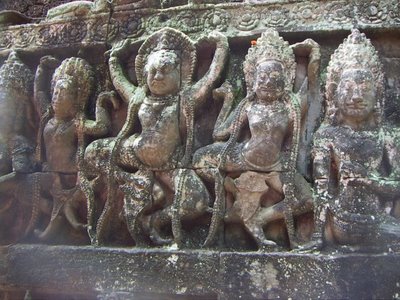antecedents

Keith Jarrett Solo Concerts: Bremen and Lausanne -> Brad Mehldau Live In Tokyo
A few years ago, it was cliché to affiliate Mehldau with Evans and now it's cliché to do the same with Jarrett. I don't know if Jarrett invented the mix of jazz, folk, pop, concert hall-ready barrelhouse, super consonance and minimalism of his 70s solos concerts, but I think it made Mehldau's LIT possible. "Things Behind The Sun," "River Man" and "Paranoid Android" sound like Jarrett stuffed back into a song structure. By the way, Solo Concerts: Bremen and Lausanne is one to get for those who like Jarrett's playing but can't stand his voice.
Unrelated to Jarrett: I'm not particularly taken with the "Monk's Dream" on LIT: I think I prefer my Monk more hard-bitten, which would explain why the most pleasing part of this version is the straight-forward theme recap at the end. All the other tracks are real songs, and Mehldau tackles them expertly.
Several years ago, I read an interview of his in which he said that the main challenge in playing post-GAS songs was finding a way to arrange them. On LIT, Mehldau applies a similar arrangement sensibility to Gershwin, Drake and Radiohead. It's a powerful one, as he never simply blows over the changes, but is constantly manipulating the song's mood and material: he's reshuffling and repainting the furniture, rather than stripping the house down to its foundations and building it back up again. It's almost like he's creating a reduction of, say, Nat King Cole singing a heavily orchestrated "Nature Boy," in real time. Actually, the Jarrettisms evoked above creep into his Gershwin, too. For example, in the percussive chords that extend the end of "Someone To Watch Over Me." It's largely gratuitous, but not entirely so, as it emphasises a note that served as a pedal*, an octave or two lower, at the beginning of the tune.
Joe Henderson The State of the Tenor -> Chris Lightcap Big Mouth
More specifically, Ron Carter's "Loose Change," with its double stops and customised straight-eights beat, sounds very much like a precursor to the kind of compositions Lightcap writes for Tony Malaby and Bill McHenry.
It's weird to think that Henderson was only 48 at the time. Even in the 60s, he looked a lot older than he was. Are enough 26 year old instrumentalists being given the opportunity to make the kind of splash the Shorters, Hendersons, Hancocks, Hills et al. could? Is it still even possible? I'd like to think so.
* It might not be a pedal, but in any case there's a note that's emphasised across a number of chords and strongly influences the character of the interpretation.
|